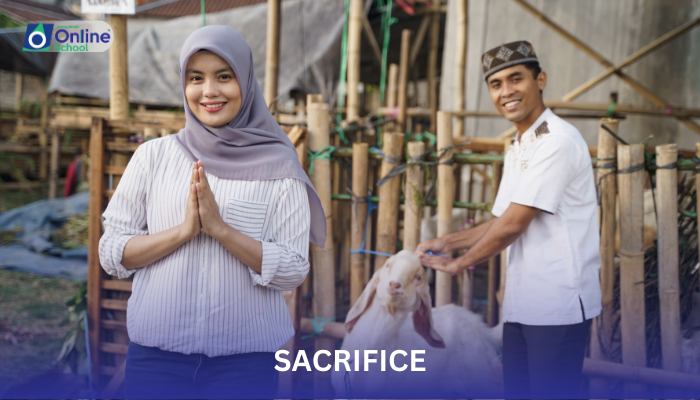
'Isaar' literal meanings are to 'give priority'. It means to give priority to the needs of others over your own needs. It is to sacrifice your own interest over other's interest. Fear of Allah produces spirit of sacrifice and greed of worldly things make a person selfish and opportunist. He takes pain to benefit Allah's creatures and this act is accepted in sight of Allah and rewarded.
i. 'Sacrifice' in the Iight of Quran:
In Holy Quran, spirit of sacrifice is appreciated.
It is said by Allah
وَيُؤْثِرُونَ عَلَى أَنْفُسِهِمْ وَلَوْ كَانَ بِهِمْ خَصَاصَةٌ (الشرق)
Translation: But give (them) preference over themselves, even though they are in privation.
Translation: And do good that you may succeed.
إنَّ اللهَ يُحِبُّ الْمُحْسِنِينَ ( البقرة: 195)
Translation: Indeed, Allah loves the doers of good.
ii. 'Sacrifice' in light of hadees:
Hazrat Muhammad trained sahabah, companions, for observing the practice of sacrifice. He said أَطْعِمُوا الْجَائِعَ، وَعُودُوا الْمَرِيضَ
Translation: Feed the poor and console the patients.
ارْحَمُوا مَنْ فِي الْأَرْضِ يَرْحَمُكُم مَنْ فِى السَّمَاءِ
,
Translation: Pay mercy on dwellers of earth, He will pay mercy on you who is on heavens.
وَاللهُ فِي عَونِ الْعَبْدِ مَا كَانَ الْعَبْدُ فِي عَونِ أَخِيهِ
Translation: Allah helps (His) slave as for as he cooperates with his brother.
لا يو من أَحَدُكُم، حَتَّى يُعث
حتى يحب لأخيه ما يحب لنفسه يُحِبُّ
Translation: No one can be (true) believer among you unless he likes for his brother what he likes for himself.
iii. Sacrifice and Prophet's Pattern:
Allah's Prophet was the best model of sacrifice and generosity as he was a role model in other traits; He led a life of extreme poverty and difficulty despite of being the head of state. The stove could not be lignited for many months in his house.
However, no needy person would ever come back empty handed from his house. When he did not have anything to give, he would take loan and would give it to the needy. Once he butchered an animal and sent its meat to his house for the purpose of distribution. After a while, he returned home and inquired how much was distributed and how much was remaining. It was told to him that fine portion of meat has been distributed and raw was left. Allah's Prophet said, "what has been distributed is saved and what has been remaining is gone in reality".
iv. Sacrifice and Prophet's companions:
The Sahabah had full spirit of sacrifice too and preferred other's needs over their own needs. It is a famous event that when the assistance was sought for the army going to fight Romans, then Hazrat Abu Baker brought all his households. Once, Hazrat usman during time of famine bought wheat coming from outside by offering double triple profit and distributed it free of cost among people.
An event regarding sacrifice of sahabah is very effective. Once a hungry person came to the Holy Prophet and there was nothing except water at Prophet's house. As usual, an Ansari sahabi took that guest to his home. The wife told him that food is sufficient for children only. He told his wife to lure the kids and make them sleep and while at time of eating food, diminish the lamp so that guest would not know that house members didn't participate in food. The same was done and that guest ate and filled his stomach. This Ansari's whole family slept hungry. When this sahabi went to Rasullulah he said that Allah was pleased greatly with his that night fair treatment of the guest. Allah (W.S.T) says while praising such sacrifice giving people:
برُونَ عَلَى أَنْفُسِهِمْ وَلَوْ كَانَ بِهِمْ خَصَاصَةٌ (المشرو)
Translation: But give (them) preference over themselves, even though they are in privation.
At the time of migration, the treatment which Ansar of Madinah gave to immigrants of Makkah, no example of such a sacrifice and excellent treatment can be found anywhere in human history.
v. Muakhat-e-Madina: The establishment of brotherhood in Madina
Prophet Muakhat-e-Madina is the best example of sacrifice and selflessness. The Holy for solving the issues of poor mahajereen, immigrants established the relation of Muakhat among them. Ansar gave all types of material sacrifice. They distributed assets of their houses, lands and garden etc to their, immigrant brothers.